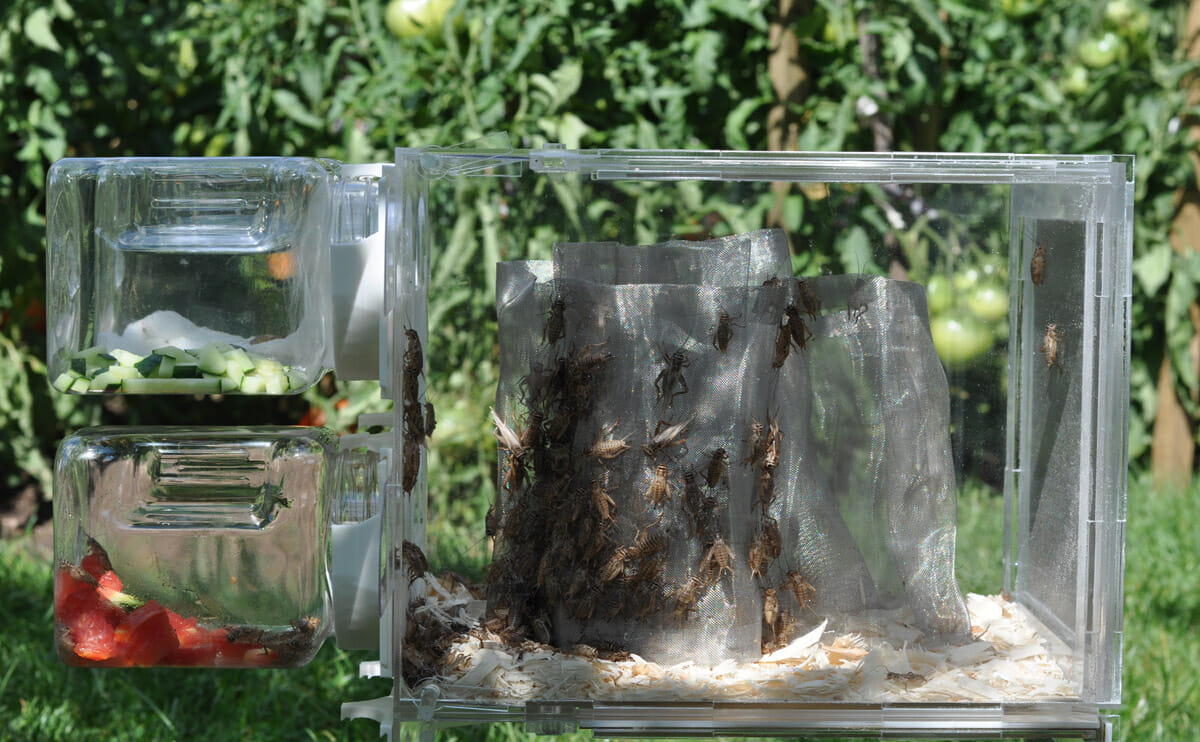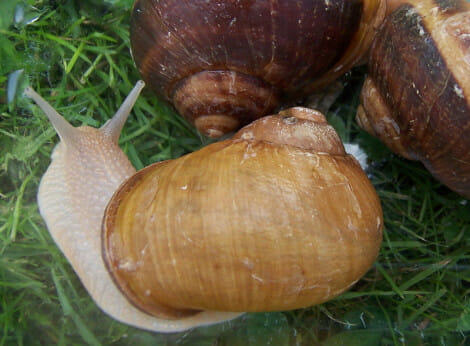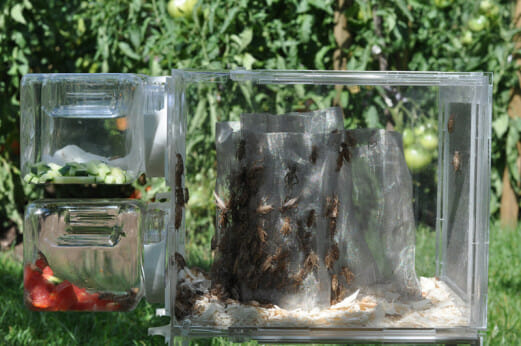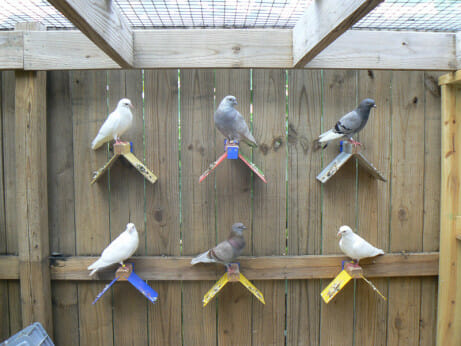Little Livestock: Beyond the Backyard Chickens
Your next urban farming might be one of these little animals.
Little Livestock: Beyond the Backyard Chickens
Your next urban farming might be one of these little animals.


For would-be farmers interested in a regular source of escargot, an urban snail farm may be a good fit. Helen Howard, a writer and professor of health and social care in Canterbury, England, started a snail farm in a spare room seven years ago and now supplies chefs and people throwing dinner parties. The story of Howard’s snail farm is detailed in her book Molluscs and Me – recipes included! – and she is currently running a crowdfunding campaign for miniature snail farms. Unfortunately, American snail lovers are currently out of luck, as Howard tells Modern Farmer via email: “One of the problems I have all the time is U.S. potential customers trying to order live snails from me and of course I can’t send them because of the USDA rules.”

Although entomophagy, or eating insects, has been common worldwide for millennia, it’s just now gaining ground in North America. It’s not a bad idea, considering that insects are high in protein and require considerably less land and resources than larger livestock. You can already buy cricket chips and power bars in the US, and roasting them plain apparently tastes a bit like almonds with a hint of bacon.
For the most local cricket experience, try rearing them in your kitchen. Jakub Dzamba, a PhD architecture student at McGill University in Montreal, is currently developing a countertop farm, which he hopes to eventually adapt for other insects. “Crickets are the gateway bug for people who haven’t eaten insects before,” he explains.
The most basic version of Dzamba’s modular farm can raise up to 700 crickets every two months on apple cores and other food scraps, with around five minutes of daily maintenance. This yields around 10 ounces of protein – enough for one course in a four-to-five person dinner, he says. A beta version is currently on sale for $150, although Dzamba also offers DIY instructions for free.

Also popular in the entomophagy trend are black soldier fly larvae, which reportedly have a rich nutty taste and can be used in recipes including granola, quiche and risotto. As with crickets, the flies can be raised on a kitchen counter. Katharina Unger, an industrial designer, created a prototype black soldier fly farm as a graduate student in Austria in 2013. Unger figures her farm can harvest around a pound of larvae each week.
Unger says the farm is low-maintenance – a bit like caring for an aquarium – and the black soldier flies are far slower than your typical housefly, which makes them easier to catch if they accidently escape. Although the farm isn’t for sale yet, Unger is looking for investors to help with development.

Adventurous new farmers who aren’t quite so adventurous as to raise and eat invertebrates might consider squab farming. Yes, squab, the fancy word for young pigeon. While this may seem quite similar to raising chickens, pigeons have the advantage that they require less room and are far quieter, says Brobson Lutz, a physician and urban squab farmer in New Orleans. Lutz started raising pigeons in 2012 in hopes of selling them to local restaurants, mainly because he missed seeing squab on the menu. But early on in his experiment, he says a “mean old tom cat” killed around two-thirds of his birds and he had to start from scratch.
Because of the cat massacre, Lutz has only raised enough pigeons to serve squab at four eight-person dinner parties over the past two years. But he’d like to increase his number of laying pairs – currently around 15 – to eventually reach his original goal of selling to restaurants.
A DIY pigeon coop, or pigeonniere, has pretty much the same requirements as a chicken coop, says Lutz. “You also need good light,” he adds, “Because if there’s no sunlight they won’t lay eggs.” He also recommends two nests per pigeon pair, so they can have young pigeons in one and lay their next round of eggs in the other.
Now, have at it, you urban farmers.
Follow us
This work is licensed under a Creative Commons Attribution-NoDerivatives 4.0 International License.
Want to republish a Modern Farmer story?
We are happy for Modern Farmer stories to be shared, and encourage you to republish our articles for your audience. When doing so, we ask that you follow these guidelines:
Please credit us and our writers
For the author byline, please use “Author Name, Modern Farmer.” At the top of our stories, if on the web, please include this text and link: “This story was originally published by Modern Farmer.”
Please make sure to include a link back to either our home page or the article URL.
At the bottom of the story, please include the following text:
“Modern Farmer is a nonprofit initiative dedicated to raising awareness and catalyzing action at the intersection of food, agriculture, and society. Read more at <link>Modern Farmer</link>.”
Use our widget
We’d like to be able to track our stories, so we ask that if you republish our content, you do so using our widget (located on the left hand side of the article). The HTML code has a built-in tracker that tells us the data and domain where the story was published, as well as view counts.
Check the image requirements
It’s your responsibility to confirm you're licensed to republish images in our articles. Some images, such as those from commercial providers, don't allow their images to be republished without permission or payment. Copyright terms are generally listed in the image caption and attribution. You are welcome to omit our images or substitute with your own. Charts and interactive graphics follow the same rules.
Don’t change too much. Or, ask us first.
Articles must be republished in their entirety. It’s okay to change references to time (“today” to “yesterday”) or location (“Iowa City, IA” to “here”). But please keep everything else the same.
If you feel strongly that a more material edit needs to be made, get in touch with us at [email protected]. We’re happy to discuss it with the original author, but we must have prior approval for changes before publication.
Special cases
Extracts. You may run the first few lines or paragraphs of the article and then say: “Read the full article at Modern Farmer” with a link back to the original article.
Quotes. You may quote authors provided you include a link back to the article URL.
Translations. These require writer approval. To inquire about translation of a Modern Farmer article, contact us at [email protected]
Signed consent / copyright release forms. These are not required, provided you are following these guidelines.
Print. Articles can be republished in print under these same rules, with the exception that you do not need to include the links.
Tag us
When sharing the story on social media, please tag us using the following: - Twitter (@ModFarm) - Facebook (@ModernFarmerMedia) - Instagram (@modfarm)
Use our content respectfully
Modern Farmer is a nonprofit and as such we share our content for free and in good faith in order to reach new audiences. Respectfully,
No selling ads against our stories. It’s okay to put our stories on pages with ads.
Don’t republish our material wholesale, or automatically; you need to select stories to be republished individually.
You have no rights to sell, license, syndicate, or otherwise represent yourself as the authorized owner of our material to any third parties. This means that you cannot actively publish or submit our work for syndication to third party platforms or apps like Apple News or Google News. We understand that publishers cannot fully control when certain third parties automatically summarize or crawl content from publishers’ own sites.
Keep in touch
We want to hear from you if you love Modern Farmer content, have a collaboration idea, or anything else to share. As a nonprofit outlet, we work in service of our community and are always open to comments, feedback, and ideas. Contact us at [email protected].by Brooke Borel, Modern Farmer
October 13, 2014
Modern Farmer Weekly
Solutions Hub
Innovations, ideas and inspiration. Actionable solutions for a resilient food system.
ExploreExplore other topics
Share With Us
We want to hear from Modern Farmer readers who have thoughtful commentary, actionable solutions, or helpful ideas to share.
SubmitNecessary cookies are absolutely essential for the website to function properly. This category only includes cookies that ensures basic functionalities and security features of the website. These cookies do not store any personal information.
Any cookies that may not be particularly necessary for the website to function and are used specifically to collect user personal data via analytics, ads, other embedded contents are termed as non-necessary cookies.